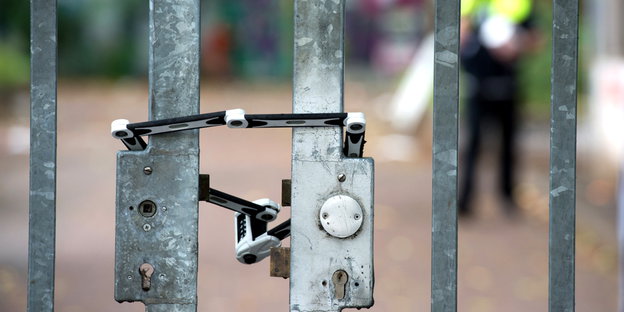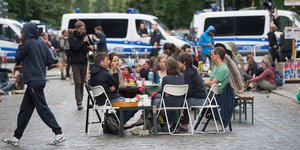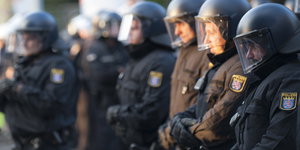Refugees in Berlin-Kreuzberg: „We were made almost crazy“
Mai M., originally from the Sudan explains: For the refugees in a Berlin school the stand off with police and state was an extreme situation.

A bicycle chain secures the gate of the former school now occupied by refugees. Bild: dpa
taz: Mrs M., you are one of the refugee squatters of the former Gerhart-Hauptmann-Schule, who reached an agreement with the district Friedrichshain-Kreuzberg. One of your most important demands, the right of residence, is not part of the agreement. Why did you sign the paper?
Mai M.: This was confusion for all of us, because all the decisions of the district and the senat and Henkel were not clear. That nine days, they said they will evict, sometimes they said no, no eviction. The situation in the school caused health problems. There was confusion and pressure, they put pressure by the police. So we tried to figure out how we can deal with the situation.
What do you think about the results of the agreement?
Actually, I didn't sign. But if the majority says yes, I don't have a problem to say yes, because if you can support something to save peoples lifes, I can do it. But for me, it's scaring, you know, to put your hand again with those people who tried to put us into a stuck situation and tried to make us crazy almost. You can see what happened at Oranienplatz. I don't trust them.
But isn't the agreement a partial success? You are allowed to stay in one section of the building.
For me, it now looks like „lager": They made an interim card, and on the card it's written, that this is no legal card. I don´t know why they do it. They do it just to control people. You have to show the card at the door when you go in and out.
comes from North-Sudan. She participated in the refugee protests from the outset. The non-violence trainer and human rights defender lives in the school and witnessed the 9-day blockade by the police.
What about all the people once lived in the school. Does everyone has a place to sleep?
I don't know the exact number, but there are more than 15 people, who want to come back to the school. They went on the march for freedom to Brussels, and in the meantime people had to leave the school. So when they came back, they had lost everything. The district refuses to give these people cards for the school. Some of them came to the school and said, we want to get our clothes from inside, but the security refused. They don't have a place to stay.
What will happen next?
The first step now will be to see how we can organise inside the building. It's clear, that they don't give us papers. But we are not giving up. We will continue the resistance.



